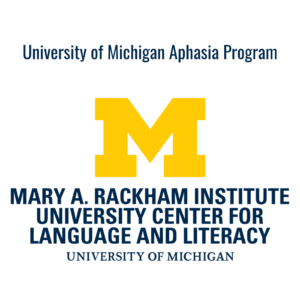 The University of Michigan Aphasia Program (UMAP) helps people with aphasia find their voice again. We do this through intensive, individualized, and innovative speech language therapy. The U-M Aphasia Program has been focusing on treating the person and not the disorder for more than 80 years. As the first aphasia-specific program in the U.S., the U-M Aphasia Program pioneered the intensive model. We have spent decades exploring and applying science-based approaches for helping people with aphasia recover communication skills.
The University of Michigan Aphasia Program (UMAP) helps people with aphasia find their voice again. We do this through intensive, individualized, and innovative speech language therapy. The U-M Aphasia Program has been focusing on treating the person and not the disorder for more than 80 years. As the first aphasia-specific program in the U.S., the U-M Aphasia Program pioneered the intensive model. We have spent decades exploring and applying science-based approaches for helping people with aphasia recover communication skills.
Life Participation Approach to Aphasia Treatment
We take a Life Participation Approach to Aphasia (LPAA) treatment, which focuses on developing and strengthening skills to build independence. We take a collaborative approach where the person with aphasia, their family, and the speech-language pathologists (SLP) are a team, working toward accomplishing life goals. Our clinicians develop a work plan to boost confidence, skills and quality of life through individualized plans for each client and their care partners.
What Makes U-M Aphasia Program Different?
In addition to our long tradition to providing care for people with aphasia (check out this video from the 1950s!), we also embrace new and innovative techniques. Another mark of our program is the intensity – our basic approach includes 25 therapy hours a week, with the option to add or go down from there, depending on the individual. A core part of our approach is to include and educate care partners; we offer a care partner education curriculum, group meetings, access to therapy sessions, social connections specifically for care partners and families, and more.
Does the Intensive, Individual Approach for Aphasia Therapy Work?
The growing body of research on intensive aphasia therapy programs shows intensity is key in helping people with aphasia build communication skills and independence, depending on type of aphasia and other variables. In our own clients, we have seen the difference intensive therapy can make. To learn more, see Aphasia Program Client Outcomes.
Contact the U-M Aphasia Program
If you are interested in learning more about our program, the intensive approach, what we can do for you, speaking with a former or current client, or just learning more about aphasia therapy in general, please contact us:
(734) 764-8440
ucll@umich.edu
AphasiaHelp.com
Contact
MI 48109
A listing in our database should not be viewed as an endorsement for any particular service, program, technology, or group. Read the full disclaimer.